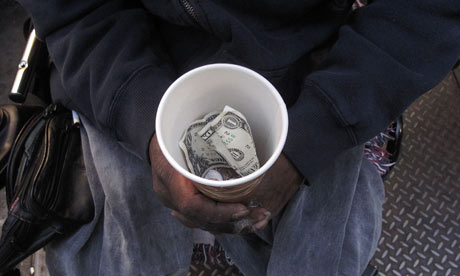The Fruit of Unfettered Capitalism
"Almost every wealthy developed nation has done a better job than we have, I am sorry to say. I think by commonly used measures, Canada has lower child poverty rates than the U.S. does, but so does most of Europe and others. And I think what this shows is we have something to learn from most other wealthy developed nations."
Arloc Sherman, poverty expert, Center on Budget and Policy Priorities, Washington
"We shall not rest until that war ['war on poverty'] is won. The richest nation on Earth can afford to win it. We cannot afford to lose it."
U.S. President Lyndon B. Johnson, 1964
"After 50 years, isn't it time to declare big government's war on poverty a failure?"
"If you are a farmer you don't need a war on drought, you need a functioning irrigation system and we need a functioning anti-poverty and pro-opportunity system."
Republican Senator Marco Rubio, Florida

Yet after 1970 the poverty rate began its slow creep back up, affecting a greater number of Americans. Now, despite the colossal Treasury dedicated to combating poverty in the United States through a multitude of social welfare aid programs, the U.S. now represents the industrialized world's greatest poverty level among its population, with 50-million Americans beset by grinding poverty. The U.S. Census Bureau attests that 16% of Americans live below the poverty line.

The war on poverty continues: nearly 50 million Americans were defined as poor in 2012. Photograph: Spencer Platt/Getty Images
In a recently published study, Sharon Parrott, a poverty analyst at the Center for Budget and Policy Priorities notes that in the years between 1964 and 2012 the share of national income flowing to the top one percent of households effectively doubled. On the other hand, between 1979 and 2012 the share of income dribbling to the poorest fifth of American households steeply descended. "If the benefits of economic growth had been more widely shared, poverty would be lower", she concluded.
Raising the minimum wage, altering the tax code for the purpose of redistributing wealth might begin to address the problem of income disparity, if those measures could rise beyond the levels of acrimonious partisan debate in Congress. Those possible measures are contested by Republicans; that jobs will be lost, and thus people will be kept poor. The natural forces of the marketplace is their preference, with the argument that consumer spending will end up trickling down to aid the poor.
 |
A homeless man sleeps on a bench in Brooklyn, New York. As of June 2013, there were a record 50,900 homeless people in New York City, including 12,100 families with 21,300 children. Spencer Platt, Getty Images, File |
The just-released job figures offer scant hope for an improved economy on the near horizon. A mere 74,000 jobs created in December, and what looked at first glance like other more optimistic numbers with the unemployment rate dropping to 6.7% from 7%, turns out to be another disappointment when looking a little deeper into the meaning. Which is that over 200,000 job-seekers have given up and stopped looking for work; no longer considered 'unemployed'.
Labels: Poverty, societal failures, United States

0 Comments:
Post a Comment
<< Home